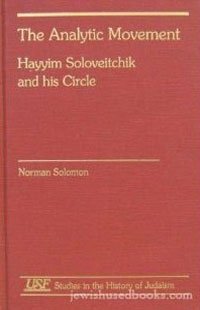In 1966 the University of Manchester accepted this work magna cum laude as a PhD thesis. Publication was not required, I felt at the time that more work was needed on it, and was in any case diverted for some years into other projects, such as raising a family and earning a living. Some chapters, however, appeared in professional journals (see /Classified Lists/On Rabbinic Logic and Interpretation) and, at the invitation of Prof Jacob Neusner, I agreed to publication of the original thesis in 1993.
The book itself is a characterization of the movement which, from the late nineteenth century onwards, came to dominate Talmudic study and hence the interpretation of Judaism in the Yeshiva world; it focuses on the lives and work of the Lithuanian rabbi/scholar Hayyim Soloveitchik and his followers, who were deeply concerned with the clarification of what they regarded as foundational concepts in halakha (legal reasoning).
I present the movement as a reaction to the secular forces which, at the time of its inception, were gaining ground in East European Jewry, and at the same time as reflecting concepts from the Analytical Positivist School of Jurisprudence in England and Austria.

